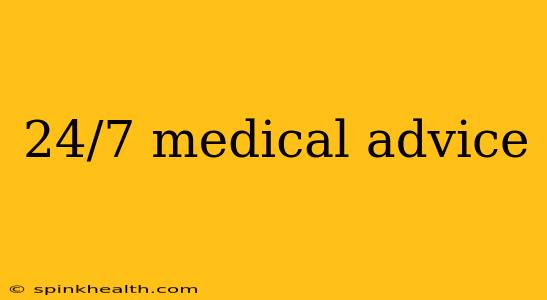The unexpected cough at 3 AM, the sudden, sharp pain in your chest, the persistent fever that refuses to break – these are moments when you desperately need medical advice, and you need it now. But finding reliable 24/7 medical advice isn't always as straightforward as it seems. This journey through the landscape of urgent care and telehealth will illuminate your options, helping you navigate these crucial moments with confidence and clarity.
What are my options for 24/7 medical advice?
This is the million-dollar question, isn't it? The good news is that accessing medical help around the clock is increasingly accessible. Your choices generally fall into these categories:
-
Urgent Care Clinics: These walk-in clinics offer immediate care for non-life-threatening conditions. They're a great option for things like sprains, minor cuts, flu-like symptoms, and infections. Unlike emergency rooms, the wait times are usually shorter, and the costs often lower. However, they aren't equipped to handle serious emergencies.
-
Emergency Rooms (ERs): For true medical emergencies – severe injuries, chest pain, difficulty breathing, stroke symptoms – the ER is your lifeline. While they offer immediate, comprehensive care, be prepared for longer wait times and significantly higher costs than urgent care.
-
Telehealth Services: The digital age has revolutionized access to healthcare. Telehealth platforms connect you with doctors via video call, phone, or messaging, offering convenient and often affordable options for non-emergency situations. Many telehealth services operate 24/7, providing a valuable bridge between routine appointments and urgent care.
When should I go to the ER instead of urgent care?
This is a crucial distinction. While urgent care handles non-life-threatening issues, the ER is designed for emergencies. Consider going to the ER if you experience:
- Severe chest pain or pressure: This could indicate a heart attack.
- Sudden, severe headache: This could be a sign of a stroke.
- Difficulty breathing: This requires immediate medical attention.
- Severe bleeding that won't stop: This necessitates immediate intervention.
- Loss of consciousness: Seek emergency help immediately.
- Severe allergic reaction: Anaphylaxis requires prompt medical care.
- Serious injuries from an accident: Broken bones, deep wounds, and head injuries require ER attention.
Remember, when in doubt, always err on the side of caution and go to the ER.
Is telehealth a reliable option for 24/7 medical advice?
Telehealth is a fantastic tool for many situations, providing convenient and often affordable access to doctors. However, it's not a replacement for in-person care in emergencies. Telehealth is best suited for:
- Follow-up appointments: Discuss test results or ongoing medication management.
- Non-emergency conditions: Cold symptoms, minor rashes, or general health concerns.
- Mental health support: Access therapy or counseling remotely.
It’s vital to choose a reputable telehealth provider with licensed medical professionals. Always clarify the provider's capabilities and limitations before relying on telehealth for your healthcare needs.
What are some reputable 24/7 telehealth services?
Numerous telehealth platforms offer 24/7 access to healthcare professionals. Research carefully and choose a service that meets your specific needs and insurance coverage. Note that this isn't an endorsement, but rather examples of the available options: Many large healthcare systems, insurance providers, and dedicated telehealth companies offer these types of services.
How can I find a 24/7 urgent care clinic near me?
An online search for "24-hour urgent care near me" is a great starting point. You can also check the websites of your local hospitals or health systems, which often list affiliated urgent care facilities. Read reviews and compare services before choosing a clinic.
Ultimately, accessing 24/7 medical advice requires understanding your options and knowing when to seek help. By having a plan and knowing where to turn, you can confidently navigate unexpected health issues and receive the timely care you deserve. Remember, proactive healthcare planning is crucial. Knowing your options and building a relationship with a primary care physician can ensure you receive the best possible care when you need it.

